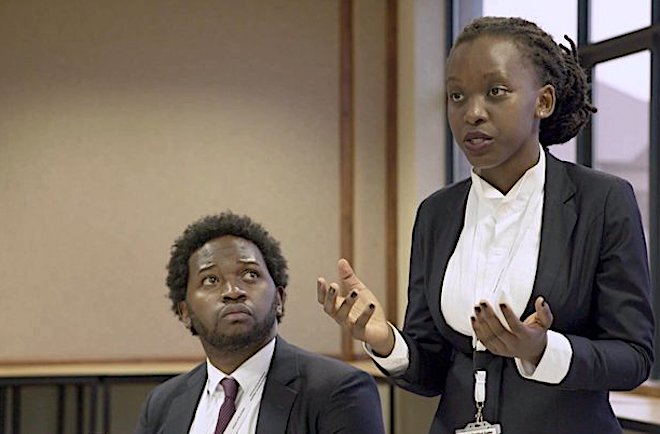Law students in Africa ... Pan African mooting ... Intense competition ... Idealism versus ambition ... Friendships strained ... "African values" and human rights ... Documentary reviewed by Max Shanahan
 Uganda's Makerere University team: Jerome Mpaata Owagage and Kagina Daniella Mushikazi
Uganda's Makerere University team: Jerome Mpaata Owagage and Kagina Daniella Mushikazi
"For some reason, mooting attracts very few people," laments University of Nairobi mooter Rachel Mdwendwa in Shameela Seedat's documentary African Moot.
For many law students, mooting is an experience best forgotten - a poorly prepared submission delivered haltingly in an empty room, under the sour glare of a disinterested student judge.
Those who do succeed in the mooting game are viewed as desperate careerists - surely, no reasonable person would willingly endure the ritual humiliation of the Corporations Moot?
Nevertheless, South African filmmaker Shameela Seedat succeeds in crafting a forceful, dramatic and entertaining documentary on this unlikeliest of topics.
African Moot follows a group of contestants in the All Africa Human Rights Moot Competition, tracing the preparation and arguments of the contestants, as well as the social and political undercurrents of the competition.
"Welcome to Vegas," says the chaperone to the mooters as they arrive at their accommodation - the 'Vegas' dorms at the University of Botswana.
It's clear from the beginning that the mooters are playing a high-stakes game. At a send off for their team, the University of Makerere mooters are told:
"There is no more sleeping for you. You have to make sure you get it right."
A similar message for the Nairobi team:
"If you come back and you're not in the top two, you've failed."
Scenes of the competitors jogging and in the gym as they prepare to travel to Botswana make it clear that something more than legal argumentation is at stake.
The familiar, and clearly universal, confidence and calculation of the law student is on show as Rachel describes the genesis of the Nairobi team:
"I met Amor and I thought: she's smart, I'm funny - what a perfect combination!"
While the follies and strengths of the law student are universal, Seedat brings out a broader undercurrent to the competition which separates it from the grim exercise of the art form in Australia - moot in every sense of the word.
Scenes of the refugee crisis - refugee issues are the topic of the moot - are spliced, as are the personal backgrounds of some of the competitors, but it is the theme of Pan-Africanism that underpins the narrative of the documentary.
In the light-filled corridors of the University of Botswana, students from across the continent mingle, joking, flirting and carping with one another in what looks like a Pan-African utopia.
There's some idealistic undergraduate talk, "... The problem is the politics they're putting into everything," nod two students wisely, and participants bond and learn over shared meals.
At the opening ceremony, competitors take care to explain the regional or national dress they've worn, as flags are paraded through a sports hall. Others are less reverential: "I just thought [the pattern] was nice, so I got this dress made."
Seedat balances the political resonance of the competition with the personalities of the competitors - who are focused on competition and achievement, occasionally at the expense of friendship.
"8.30 in the morning ... that's inhumane" groans one student as he receives his schedule, while the fears of the mooters are always at the forefront, "we'll get eaten alive," fears Daniella, the competition's reigning Best Oralist.
For Arouk, from the American University of Cairo, the pressure has been too much:
"I stopped smoking and now I'm going through half a pack of cigarettes."
Skilfully, Seedat is able to make the mooting - by no means usually known for its dramatic qualities - tense and engaging. One squirms and sweats along with the mooters, willing them to find the obscure case called for in the recesses of their sleep-deprived minds.
After a dinner announcing the finalists, which ends in a swirl of drinking and dancing, the students arrive late and hungover to a human rights conference organised for the next day.
It's directly after this apotheosis of unity and fellow feeling that conflict develops. The invocation of "African values" by a conference speaker to deny the prospect of law reform on LGBTI rights divides the cohort and stains the previously optimistic views of some of the competitors.
"Before the moot, I had more faith in African unification," reflects Edward, a queer South African competitor.
"I feel more safe in spaces where I don't feel my African identity is being questioned or undermined."
Being forced to defend fictional human rights-denying states likewise brings critical reflections on the utility of law as a tool for change:
"You look from the outside and it's a great world where it's governed by order and it's never wrong in a sense, but then you examine how it's applied to people's lives and you realise - actually, it's not that empowering in many cases."
From the bright, cosmopolitan corridors of the moot's beginning, many of the students depart Vegas with outlooks darkened or friendships strained.
As the documentary-maker catches up with the competitors months after the competition, Seedat leaves the viewer questioning whether, as the artificial reality of university comes to an end and competition and ambition goes from moot to actual, the unity of the students was anything other than a product of youthful excitement.
In the argumentation scenes, the tension between idealism and ambition, the personalities of the students, and the reflections on law's utility, there is something that will touch lawyers and students everywhere.